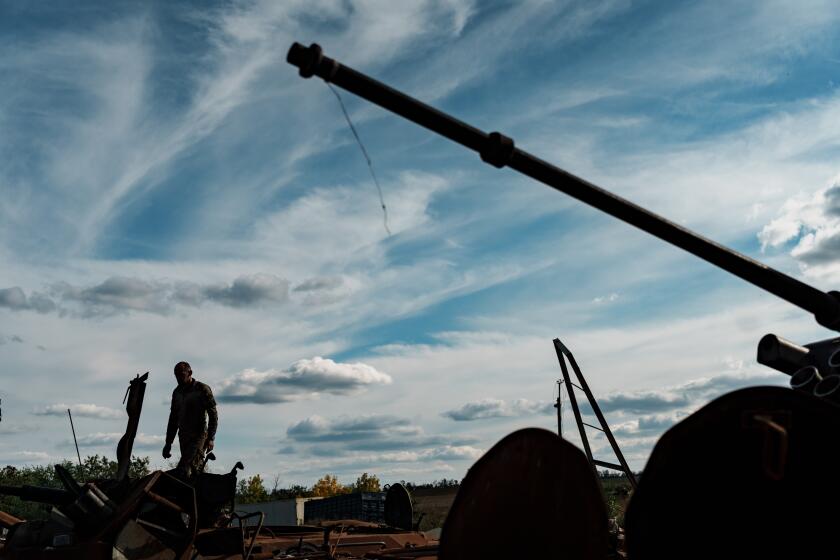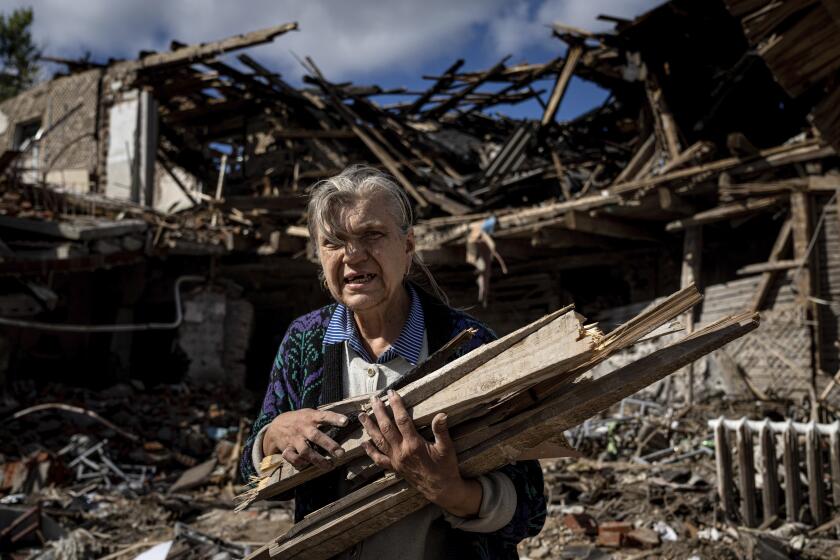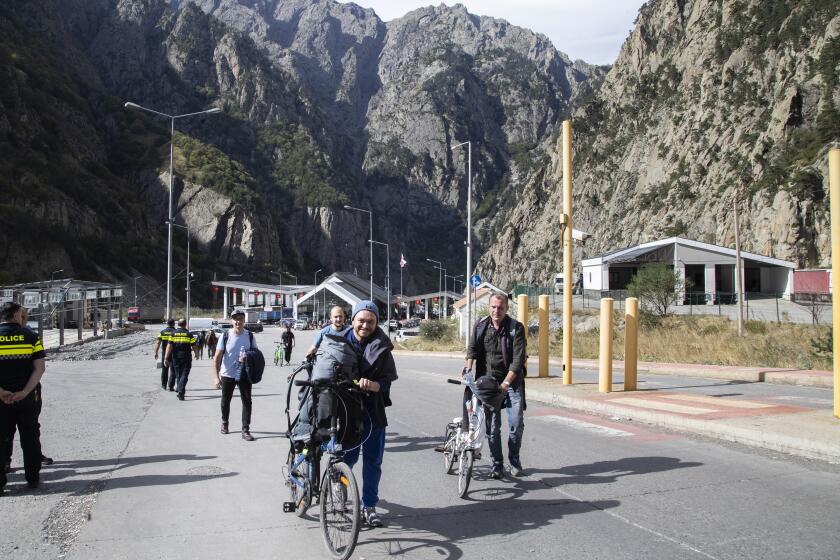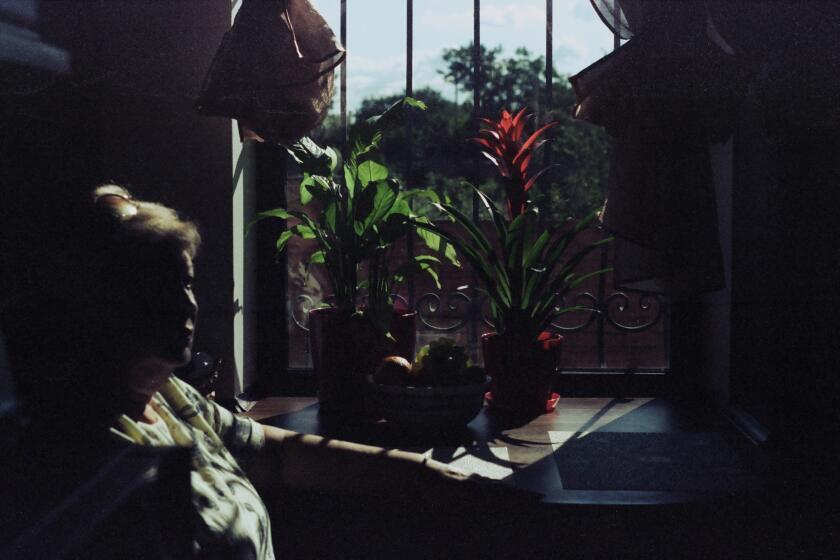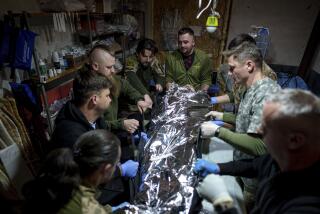The bleak Ukrainian landscape Russia leaves behind: Corpses in the garden, land mines and fear
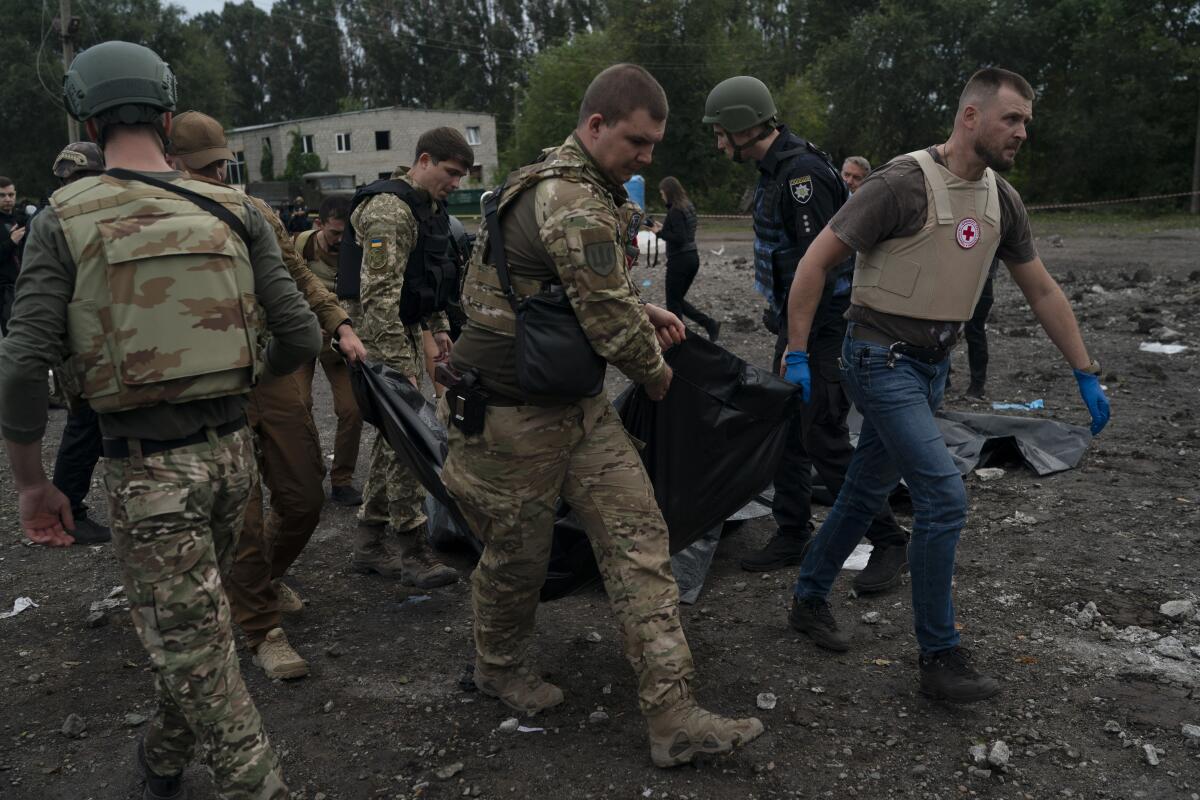
SVIATOHIRSK, Ukraine — Corpses in need of reburial, traumatized villagers, rocket remnants strewn across sunflower fields: In eastern Ukraine, this is the bleak landscape left behind when Russian troops fled.
Over the last six weeks, Ukrainian troops have recaptured thousands of square miles of territory in the northeast, east and south. Racing a cold-weather clock, Ukraine is pressing ahead with a multifront offensive despite Russia’s punishing bombardment of heavily populated areas far from the battlefield and its relentless attacks on the country’s energy infrastructure.
For those living in newly liberated towns and villages that spent months under Russian occupation, wreckage is everywhere, and paralyzing fear is slow to dissipate.
In the riverside town of Sviatohirsk, in the northern part of Donetsk province, even the dogs are jittery.
Russian forces captured the town in June, less than four months into the war. As Ukrainian and Russian troops traded artillery fire along the adjacent front line, “the dogs barked nonstop,” recalled Raisa Nikolaevna, a Sviatohirsk resident in her 60s.
Ukrainian forces retook the town in mid-September, and the fighting has now moved about a dozen miles away. But the sound of speeding military vehicles and the distant thud of shelling still sets off a frantic canine chorus in Nikolaevna’s backyard.
Plumes of smoke can be seen on the horizon, and Ukrainian fighter jets roar overhead. On a road outside town, a Ukrainian soldier at a checkpoint offers an admonition: Drive fast, but don’t use your seatbelt. If there’s an artillery strike, you need to be able to crawl from your car.
Rights groups say Moscow’s practice of transporting captured Ukrainian civilians to Russia is illegal under international law. Hundreds, perhaps thousands, have vanished from Russian-occupied areas.
A 67-year-old retired cleaning lady agreed to an interview but would give only her first name — Halya — because she feared Russians might come back and “use my words against me.”
She recounted her escape from Sviatohirsk in early summer: making her way over the bridge spanning the Seversky Donets River as fires raged on all sides, sheltering for a few nights in a 16th century monastery, eventually finding safety to the west.
Her hometown was scarcely recognizable when she returned. Buildings and bridges are smashed. The surrounding forest is dotted with abandoned Russian camps. Along a road outside town, the charred remains of two Russian tanks are now home to a litter of kittens, cared for by Ukrainian troops.
During the occupation, residents were forbidden to leave their property. If someone died, whether from fighting, privation or natural causes, their families had to bury them in adjoining gardens or orchards. Town officials said that 29 such corpses have been recovered, and that the deaths will be investigated.
A team of experts commissioned by the U.N. says its initial investigation has turned up evidence of war crimes by Russian troops in Ukraine.
Three of Halya’s neighbors were killed in fires sparked by shelling; after her return, she watched their bodies being exhumed for proper burial. Recalling the scene, Halya forgot her caution and raged at Russian President Vladimir Putin, who recently announced the annexation of Donetsk and three other Ukrainian provinces.
“He won’t stop because he is so afraid he will lose,” she said. “He should just shoot himself!”
A neighboring couple in their mid-70s — Oleksandr Federovich and his wife, Lubov Dmitrievna, who identified themselves only by their first names and patronymics — told of spending 100 nights sleeping on wood planks in their basement after their home was damaged by shelling and Russian soldiers ordered them not to leave.
The occupiers tried to use townspeople as a shield, the two said. When Ukrainian forces stationed across the river began flying surveillance drones over the town to try to assess enemy troop strength, the Russians would move about in civilian clothing. They also forced local people to wear white armbands of the kind the Russian military used.
In numbers comparable to the size of Putin’s 300,000-strong mobilization, Russian men are fleeing military call-up. Not everyone welcomes them.
The couple are happy that Ukrainian forces are back in control, despite the looming prospect of a cold winter with no running water and only firewood for heat. They scoffed at Putin’s recent annexation proclamation.
“We have always lived in Ukraine, and not Russia,” said Oleksandr.
In what remained of the blasted town square, a few people grilled meat and vegetables. Among them was Mikhail Lukianec, the deputy mayor.
Town officials, he said, are preoccupied with trying to restore utilities and remove Russian mines. The town had a prewar population of 4,500, but those who fled are being ordered to stay away until de-mining is complete.
Those who stayed, many of them elderly, live among ruins. Valentina Mokorusova, 77, said her home was so badly damaged — a leaking roof, a smashed garage, broken windows — that she and her husband were sleeping in the backyard.
“Everything is destroyed,” she said.
Ukrainian authorities believe cases of sexual assault by Russian occupiers are vastly underreported. Shame and many factors underlie survivors’ unwillingness to report rapes.
Next door to Oleksandr and Lubov’s damaged house, an 8-year-old boy named Sasha rode his bicycle up and down the street.
His mother, Oksana, who had been picking vegetables in her garden, said the family was from Mykolaivka, a city about 75 miles to the south that came under control of pro-Russian separatists in 2014, the year Sasha was born. A child of war, she called him.
The family eventually took refuge in Sviatohirsk, but war followed them. After the Russian invasion on Feb. 24, Oksana managed to send her four older children to safety, but she and her husband could not afford to leave, and Sasha was too young to travel with his siblings.
So the three of them stayed on. Living on what they could grow in their garden, she and her husband were each knocked out several times by nearby shelling when they slipped out to gather food, she said. Sasha’s school, which he could not attend anyway, was wrecked. Explosions constantly sounded. Russian soldiers patrolled outside.
Even after the town’s liberation, months of constant fear left its mark.
“We barely laugh anymore,” she said. Her husband briefly appeared at the window, but then shrank back into the dark — unwilling, like Sasha, to speak with anyone yet.
Only Oksana seemed to rally herself.
“The main thing now,” she said, “is that we survive the winter.”
Adler is a special correspondent. Times staff writer Laura King in Washington contributed to this report.
More to Read
Sign up for Essential California
The most important California stories and recommendations in your inbox every morning.
You may occasionally receive promotional content from the Los Angeles Times.
